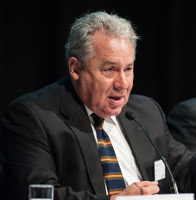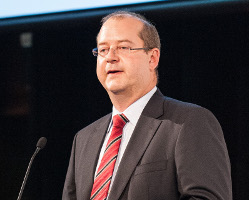Explore our Climate and Energy Hub
06/03/2013
|
Skip to read: |
Expensive Australian labour is not a bad thing, Federal Shadow Treasurer, Joe Hockey told the audience at CEDA's Economic and Political Overview event in Brisbane.
"We can compete with higher wages provided our output per worker is globally competitive," he said.
"Australia's standard of living must not go backwards. There is no national benefit in cutting wages.
"What we need to do is to ensure that our workers have the skills and knowledge that our industry needs.
"Education, training and retraining is a key step to unlock labour productivity gains.
"And we need to ensure employment conditions can meet the varied and changing requirements of Australian workers and Australian businesses.
"The way to accommodate and indeed thrive with high wage costs is to focus on lifting productivity so that the per unit labour cost is competitive."
Mr Hockey said that Australian businesses face challenges with regards to the costs for energy.
"Australia should have more affordable energy. We have enormous reserves of energy and in particular an abundance of coal and gas," he said.
"And yet, as we have seen, Australian businesses face costs for energy that are relatively high by global standards."
In addition he said: "There is no doubt that the high Australian dollar is impeding the competitiveness of Australian exporters and making life difficult for Australian producers who compete with imported products.
"Tourism, education, the rural sector and manufacturing are all feeling the pain.
"But on the other side of the coin, the high Australian dollar brings benefits for businesses which rely on imported goods, and for consumers who purchase cheaper imported products."
Mr Hockey said movements in the currency create losers but also winners but "we would encourage businesses to view the high dollar as an opportunity.
"A high dollar means imports are cheap," he said.
"Business should be utilising this period to import cutting edge equipment and world-class technology so as to boost the productivity and efficiency of their domestic operations."
ANZ, Chief Economist, Warren Hogan said: "Potentially in 2013, at a stage where we're going to be leaving a lot of GFC legacy behind we're going to go into a new renewed global expansion, he said.
The damage done to confidence by the financial crisis has been "an enduring feature of the world scene for the last six years, and I've believe we may be on the cusp of moving beyond this period of impaired sentiment," he said.
believe we may be on the cusp of moving beyond this period of impaired sentiment," he said.
The world economy has been volatile for the last five years, which caused investors to be very cautious but in the last six-seven months markets have been improving, he said.
From the gains seen in equities and so forth, there is reason to think that investors, for the first time since the GFC, are starting to look forward and buy capital rather than worry about what will be the next disaster in the world economy, he said.
"The question for 2013 is whether or not that return of confidence in the financial markets will make us step into the real economy," he said.
On the Australian economy he said: "We've got a high level of investment in mining, and we might get a bit more growth in the next 12 months, but we have to go to the rest of the economy for growth."
Business is the key and we need to get non-business mining investment going because consumers are not going to give us the extra growth we need, he said.
News.com.au, National Political Editor, Malcolm Farr said the Opposition has been assisted by some amazing events, stumbles and incidents, but soon there will be pressure building for Tony Abbott to reveal the details and mechanics of the Coalition's policies.
"There's a whole range of stresses that have been placed on Labor and the Government purely from Tony Abbott's…campaign as Opposition Leader," he said.
"He has given us more detail of what he would dismantle than what he would build (and) he's been able to get away with that for some time.
"But he cannot continue in that vein for much longer. He is going to have to go into the detail and mechanics of his policies."
Mr Farr also said Tony Abbott is showing immense constraint in one of the most carefully managed election campaigns I've ever seen in Australian politics, he said.
Tony Abbott is a genuine radical, who likes arguing cases loudly, but this is not the Tony Abbott we've seen this year, he said.
He has exercised an enormous amount of campaign discipline in one of the most carefully managed election campaigns I've seen in Australian politics, Mr Farr said.
CEDA, Chief Executive, Professor the Hon. Stephen Martin said the number one concern that has been raised around the country at CEDA's forums is the nature and future of Australia's economy.
Australia is currently in a very unique economic and political environment; we have a hung parliament, we're seven months from a pre-announced election and we have faced some tough economic times, he said.
Now, we need to think about the mix of our economy, the skills we need, and what level of innovation is required for Australia to achieve greatness, he said.
Professor Martin said the other important issues which were raised include:
- Economic management;
- Improving Australia's productivity and innovation;
- Cost of living - particularly electricity pricing;
- Illegal immigration; and
- Superannuation.
Australian National University, Visiting Fellow, Dean Parham said capital productivity is responsible for Australia's overall slump in productivity performance.
"Since 2003/2004 the big change has been capital productivity: capital productivity has tanked…It has declined by about 20 per cent," he said.
"Whilst labour productivity has gone up 3.3 per cent, capital productivity has declined by 3.4 per cent.
"So the overall change in multifactor labour productivity has been next to nil.
"The take way message is that Australia's overall productivity performance is not going to pick up fundamentally until capital productivity levels out (and) stops falling."
Mr Parham said four industries are mostly responsible for the decline in capital productivity: transport; mining; manufacturing; and electricity, gas, water and waste services (EGWWS).
"Together, these four industries account for about half of Australia's capital stock - non-dwelling capital stock," he said.
There have been large increases in capital investment, particularly in mining and EGWWS, but they're not getting the same output growth, he said.
We would expect to see growth in capital go parallel with the growth in output, but there is no sign of that yet and we can expect the investment in the mining sector to continue for some time, he said.
Mr Parham said that the terms of trade have driven Australia's growth in real income, but that won't continue into the future.
So we really need the reinvigoration of productivity growth if we are going to get the same or similar growth in real income going forward, he said.
While our productivity growth is not going to spring back immediately, it will return as a matter of course as capital productivity flattens out, he said.
Now things are getting tougher, there will be an increased focus on productivity and getting costs down, he said.
"While the regulatory environment, in my view, cannot explain the extent of the productivity slump…it is very relevant to the future and looking forward," he said.
Queensland Competition Authority (QCA), Chairman, Dr Malcolm Roberts said the Queensland electricity price increases recently announced are very significant and undoubtedly will cause hardship to many customers, no one takes any job in that, but are set to ensure fairness for consumers as well as a sustainable industry.
Electricity prices are an enormously complicated issue that has an immediate impact on the community and is probably not very well understood.
"Certainly one of the ambitions of the QCA this year is to continue the education of all the stakeholders involved so that people begin to understand that the determinations made by the QCA reflect the prices that are necessary to support a sustainable, competitive electricity market in Queensland," he said.
"And that ultimately is the best guarantee for the customer.
"It's important to look beyond the headlines and understand the factors that are driving high electricity prices."
High on the QCA agenda this year is economic regulation of infrastructure, dealing with the red tape re-education program and driving regulatory change, he said.
On economic regulation of infrastructure Dr Roberts said: It has been 20 years since the Hilmer report, which "significantly strengthened our economy, improved the nature of services we receive, and encouraged investment where it can do the most good."
"Hilmer's answer, rightly, was to inject more competition into those sectors to support a more open and competitive economy. And over the last 20 years we've seen the effects of that roll through.
"In 2013, we've got the chance to look at one of the key aspects of that agenda.
"And arguably we are facing different times: the excess capacity has been soaked up; the investors are now private rather than government."
Now, we need to shift focus not on getting best use of what we have, but continuing investment in the infrastructure we need for the future, he said.
